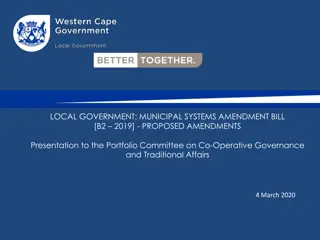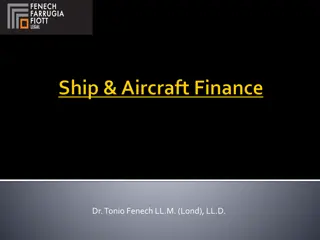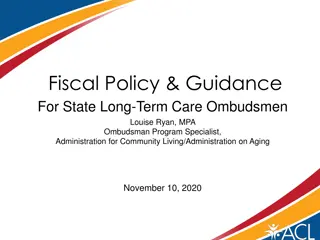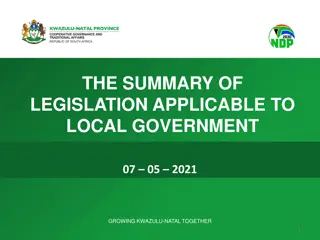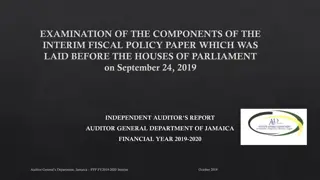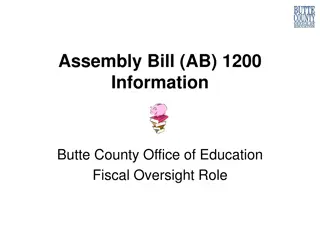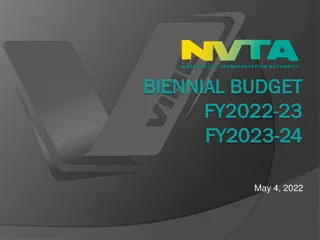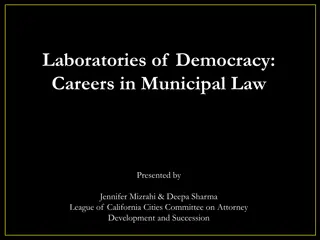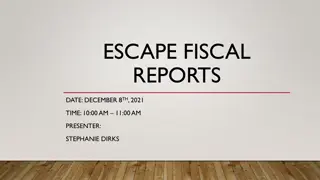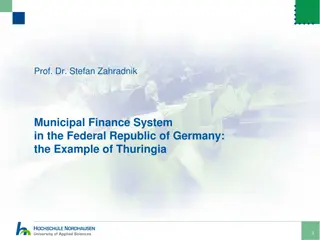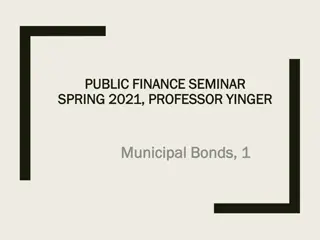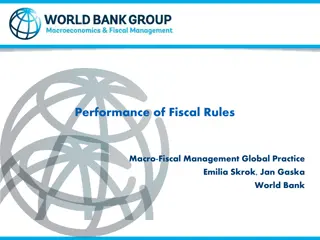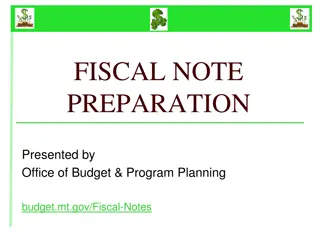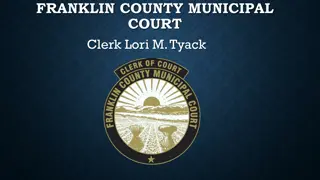Challenges and Solutions in Municipal Finance & Local Fiscal Systems
Cities worldwide are facing challenges in funding urban infrastructure while adapting to population growth. A framework for fiscal health is crucial to support sustainable development goals. Key elements include fiscal performance, regulations governing municipal finance systems, and decentralized financial resources. Collaboration among national, state, and local governments is essential for building inclusive, safe, and resilient cities.
Download Presentation

Please find below an Image/Link to download the presentation.
The content on the website is provided AS IS for your information and personal use only. It may not be sold, licensed, or shared on other websites without obtaining consent from the author.If you encounter any issues during the download, it is possible that the publisher has removed the file from their server.
You are allowed to download the files provided on this website for personal or commercial use, subject to the condition that they are used lawfully. All files are the property of their respective owners.
The content on the website is provided AS IS for your information and personal use only. It may not be sold, licensed, or shared on other websites without obtaining consent from the author.
E N D
Presentation Transcript
Open Open- -Ended Informal Consultative Meetings Ended Informal Consultative Meetings Panel on Municipal Finance & Local Fiscal Systems Presenter: Lourdes German Co-Lead Organizations: The Lincoln Institute of Land Policy & The World Bank New York, April 2016
POLICY UNIT 5 CO POLICY UNIT 5 CO- -LEADS LEADS George W. Mac McCarthy Lincoln Institute of Land Policy Roland White The World Bank AGENDA AGENDA The Challenges Cities Face Priority Areas & Key Items for The New Urban Agenda in Municipal Finance Examples & Discussion Conclusion & Thank You
I. THE CHALLENGES CITIES FACE I. THE CHALLENGES CITIES FACE
II. MUNICIPAL FINANCE & THE NEW URBAN AGENDA II. MUNICIPAL FINANCE & THE NEW URBAN AGENDA
VISION & FRAMEWORK Cities face increasingly complex responsibilities, complicated by chronically insufficient funding & capacity constraints. Approximately 6% of GDP ($5 Trillion USD) is estimated as necessary to pay for the urban infrastructure to support 2.5 billion in population growth expected in cities. A framework is needed to promote fiscal health & advance inclusive, safe, and resilient cities - Sustainable Development Goal (SDG) 11 with participation at all levels national, state, and local governments.
ELEMENTS & PRIORITIES Sound fiscal performance of local governments rest on: The Rules of the Game Expenditures Revenues Financial management Borrowing Special Issues: Climate Finance Public Private Partnerships
RULES OF THE GAME Municipal finance systems rest on the policies, regulations and laws that create the enabling framework for fiscal governance Systems that define a municipality s powers and responsibilities vary world-wide (Federal, Unitary, etc.) Most relevant are policy recommendations in the realm of fiscal decentralization: when local governments are tasked with carrying out decentralized functions with expenditure requirements, there must be a concomitant devolution of financial resources.
EXPENDITURES One of the biggest expenditure challenges facing governments is the growing gap in infrastructure funding and financing. Increasing the efficiency of local government spending begins by holding local government officials accountable for the provision of quality public services while operating within a fixed budget constraint. Priority Areas for Policy Reform Include: Higher level governments can create incentives of local officials to improve expenditure efficiency Aligning work of spatial and economic development planners and public finance can achieve capital expenditure efficiency Measures to strengthen local government accountability in expenditures Measures to exploit service delivery based on economies of scale
REVENUES Majority of local government revenues come from intergovernmental transfers to fund operations & capital Own Source Revenues Charges & Fees Revenues Own Source revenues are the second major component of revenues & typically originate from charges, user fees, or property taxes Own Source Revenues Taxes Inter- governmental Revenues
INTERGOVERMENTAL TRANSFERS The essential purpose of fiscal transfers is to bridge the gap between the cost of providing municipal services and the revenues that municipalities are able to raise. Our focus is on policy grants mechanism and policy reform in developed and developing countries. Priority Areas for Policy Reform Include: Aggregate transfers should be sufficient to cover or narrow fiscal gaps Improved grant design must also be prioritized Fiscal transfers should be allocated on the basis of clear and transparent formulas Policy should limit grant proliferation Policy should establish a framework for efficient transfer execution
OWN-SOURCE REVENUES Local governments need an enabling framework that sets foundation for collection of taxes, fees, and charges: constitution, laws, policies Challenges that inhibit local government s ability to raise own-source revenues (where enabling authority is present) include: technical capacity, inefficiencies in collection & administration, informal economies, and others. Priority Areas for Policy Reform Include: Appropriate devolution of the authority to collect local taxes, to set rates, and to control assessments of tax bases Flexibility must exist for local governments to adopt the right mix of revenue sources to generate budget stability over time Property tax & land based financing are strong own-source revenue options that support spatial planning goals & others
FINANCIAL MANAGEMENT Well-functioning financial management systems enable local governments to steward public resources effectively and achieve: Efficient, transparent & accountable use of resources Strategic planning for growth & crises Expanded access to sophisticated & diverse revenue sources Internal capacity & partnerships to execute governance functions Priority Areas for Policy Reform Include: Addressing weaknesses in planning & budgeting Accounting & reporting practices Information technology Monitoring & oversight systems Reduced staff capacities Adopting cohesive reform efforts rather than disjointed ones
BORROWING Debt converts future revenues into capital that is immediately available for investment, encumbering future revenues for debt service payments. Access to debt allows local governments to finance long term, inter- generational equitable infrastructure. Broadly, three categories of municipal borrowing market can be defined Mature, Developing & Undeveloped Priority Areas for Policy Reform Include: In Mature Markets, borrowing systems require improvement at the margin In Undeveloped Markets, the fundamental conditions for borrowing have yet to emerge; other aspects of municipal finance reform are priority In Developing Markets, key focus areas are: golden rule (borrow only to finance capital not operating expenses) & developing robust regulatory framework of ex ante rules
CLIMATE FINANCE Sound fiscal performance of local government is necessary to realize climate change mitigation goals agreed at the C0P21 Sustainable Innovation Forum. Over the next 15 years, roughly $93 trillion of infrastructure designed to be low-emission and climate-resilient will need to be built globally. The challenge is creating an enabling environment that encourages existing and new capital to flow from a broad spectrum of sources.
PUBLIC PRIVATE PARTNERSHIPS P3 projects can provide public services and benefits to local populations when government provision of the services is fiscally constrained. Key policy challenge lies in creating an enabling framework where projects can succeed, which can be enhanced by: Strong users-pay culture Permanent Advisory Facilities Sectoral Strategies National Government Systematic Training Units Regional Collaboration
IV. EXAMPLES VIA MODERATED DISCUSSION IV. EXAMPLES VIA MODERATED DISCUSSION
THANK YOU THANK YOU Lourdes German Director, International & Institute-wide Initiatives Lincoln Institute of Land Policy lgerman@lincolninst.edu Presenting on behalf of Policy Co-Lead Organizations: The Lincoln Institute of Land Policy & The World Bank




